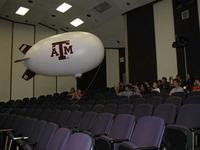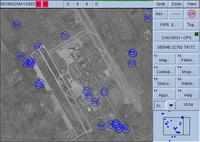-
Tiny flying machines revolutionize surveillance work
Tiny aerial vehicles are being developed with innovative flapping wings based on those of real-life insects; incorporating micro-cameras, these revolutionary insect-size vehicles will be suitable for many different purposes ranging from helping in emergency situations considered too dangerous for people to enter, to covert military surveillance missions
-
-
Micro-robots emulate water-striding insects

Researchers are working on building nimble micro-robots that are able to skim across the surface of water; the prototype devices emulate water-striding insects such as mosquitoes and water spiders, and could be used for military spy missions, water-pollution monitoring, and other applications
-
-
Designing a more effective crystal ball
A new model for crowdsourcing predictions called Aggregative Contingent Estimation System (ACES) is transforming the way future events are forecast — combining the collective knowledge of many individual opinions in a unique way that improves accuracy beyond what any one person or small group of experts could provide
-
-
The world’s first "printed" aircraft flies
Engineers have designed and flown the world’s first “printed” aircraft, which could revolutionize the economics of aircraft design; the plane is a UAV whose entire structure has been printed, including wings, integral control surfaces, and access hatches; it was printed on an EOS EOSINT P730 nylon laser sintering machine, which fabricates plastic or metal objects, building up the item layer by layer
-
-
Texas A&M launches a blimp program

Texas A&M is launching a new airship program to develop lighter-than-air (LTA) blimps; LTA systems generate lift force by using sufficient volume of a lighter-than-air gas, such as helium; heavier-than-air (HTA) systems, on the other hand, generate lift by a relative motion between the wings or rotor blades and ambient air; airships can contribute to a number of missions including disaster response, homeland security, and communications relay
-
-
Expanding Yuma flight testing schedule for Argus UAV
The World Surveillance Group (WSGI) revealed its plans of extending the flight testing schedule for its strange-looking Argus One UAV at the Yuma facilities at the U.S Army grounds in Arizona
-
-
State Department to begin tracking its personnel

The U.S. State Department will soon be able to track the movement of its staff as they conduct diplomatic missions in dangerous areas in countries like Pakistan, Iraq, Yemen, and Afghanistan; using the Blue Force Tracker system, the State Department will be able to monitor its personnel’s movements via a small transmitter attached to a vehicle, aircraft, or a person
-
-
FBI investigates News Corp. for potential 9/11 victim hacks
Lawmakers in the United States have waded into the growing controversy that has engulfed Rupert Murdoch’s media empire; on Wednesday several Democratic senators and Representative Pete King (R-New York), requested that the FBI begin an investigation into whether News Corp. attempted to hack into the phones of 9/11 victims; in response to their calls, the FBI opened an investigation into News Corp. to determine if the allegations of bribery and wiretapping are true
-
-
Texas gets second UAV
Border agents in south Texas will be getting additional help thanks to the deployment of a second unmanned aerial vehicle (UAV) in the area; currently there are four UAVs deployed along the U.S.-Mexico border and three of them are based in Arizona; the second drone is expected to arrive later this year or in the early part of next year.
-
-
Satellites could predict next cholera outbreak
With cholera making an unlikely resurgence, catching countries like Haiti and Pakistan by surprise, public health officials are exploring the potential for new technology to help stem the spread of future outbreaks; each year the disease affects three to five million people and claims more than 100,000 lives; researchers believe that satellite images of oceans could help forecast when a cholera outbreak is likely to strike
-
-
Cook County, Illinois cancels troubled security camera program
Contrary to the latest trends, Cook County, Illinois is scrapping a project to equip police departments with real time streaming cameras; Cook County canceled Project Shield, a $44 million federally funded initiative to provide 128 local police departments with cameras in squad cars and stationary locations that streamed live video to central command centers; the program has been plagued by technical problems, cost overruns, and shoddy performance
-
-
New Haven, Connecticut police begin installing security cameras
New Haven police plan to install twenty-one surveillance cameras in the city’s hot spots for crime. The cameras will give officers a 360 degree view of an area’s streets and sidewalks; police hope that the cameras will help reduce New Haven’s rising violent crime rate; in the first half of 2011, more than eighteen people have been killed
-
-
Supreme Court to hear GPS tracking case
The 220-year old Fourth Amendment to the Constitution offers protection against unreasonable searches; the Supreme Court agreed to hear a case involving the police secretly attaching a GPS device to a suspect’s car to monitor his movement; the question before the Court: does the secret placement of a GPS device on a suspect’s car in order to keep tabs on him for an extended period of time require a search warrant
-
-
China installs covert spy devices on Hong Kong cars
A Chinese newspaper recently revealed that China has been installing spying devices on cars in Hong Kong for years, creating a vast eavesdropping network across the island; the recording devices were installed as “inspection and quarantine cards” beginning in July 2007 on all vehicles that had dual Chinese and Hong Kong license plates; it is estimated that at least 20,000 cars and tens of thousands of trucks and buses in Hong Kong have dual license plates
-
-
Germany's E. coli outbreak mystery deepens
Germany desperately tries to identify source of deadliest-ever recorded outbreak of E. coli, while country leaders concede that country was unprepared
-
- All
- Regional
- Water
- Biometrics
- Borders/Immig
- Business
- Cybersecurity
- Detection
- Disasters
- Government
- Infrastructure
- International
- Public health
- Public Safety
- Communication interoperabillity
- Emergency services
- Emergency medical services
- Fire
- First response
- IEDs
- Law Enforcement
- Law Enforcement Technology
- Military technology
- Nonlethal weapons
- Nuclear weapons
- Personal protection equipment
- Police
- Notification /alert systems
- Situational awareness
- Weapons systems
- Sci-Tech
- Sector Reports
- Surveillance
- Transportation
Advertising & Marketing: advertise@newswirepubs.com
Editorial: editor@newswirepubs.com
General: info@newswirepubs.com
2010-2011 © News Wire Publications, LLC News Wire Publications, LLC
220 Old Country Road | Suite 200 | Mineola | New York | 11501
Permissions and Policies
Editorial: editor@newswirepubs.com
General: info@newswirepubs.com
2010-2011 © News Wire Publications, LLC News Wire Publications, LLC
220 Old Country Road | Suite 200 | Mineola | New York | 11501
Permissions and Policies
